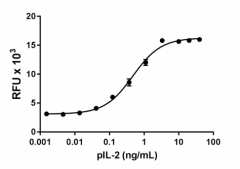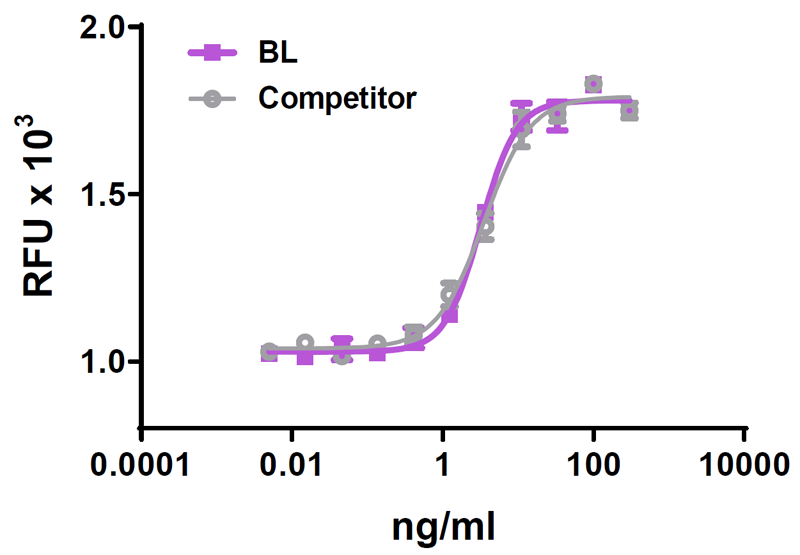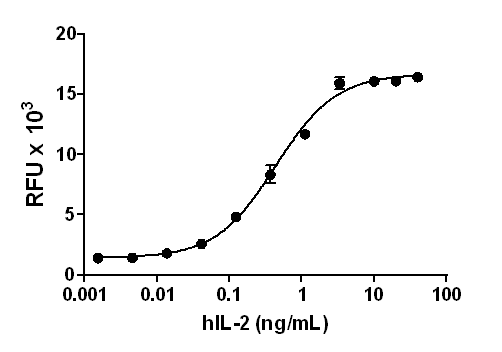- Regulatory Status
- RUO
- Other Names
- T-cell growth factor (TCGF), Eosinophil differentiation factor (EDF), Killer cell helper factor (KHF), Macrophage-activating factor for cytotoxicity I (MAF-C I), Thymocyte differentiation factor (TDF), Lymphokine
- Ave. Rating
- Submit a Review

| Cat # | Size | Price | Quantity Check Availability | Save | ||
|---|---|---|---|---|---|---|
| 782601 | 5 µg | £77 | ||||
| 782603 | 20 µg | £174 | ||||
IL-2 was discovered through its function as a T cell growth factor (TCGF), and plays a pivotal role in immune responses against pathogenic infection. Recognition and binding of foreign antigens by the TCRs stimulate both the secretion of IL-2 and the expression of IL-2Rs on the T cell surface. Subsequently, the IL-2/IL-2R interaction activates the intracellular Ras/Raf/MAPK, JAK/STAT, and PI3K/AKT signaling pathways, and ultimately stimulates the growth, differentiation, and survival of the antigen-selected cytotoxic T cells. Human IL-2 acts on murine and human T cells, and its receptors are shared by other cytokines. IL-2Rα is an IL-2–specific receptor, IL-2Rβ is shared with IL-15 and the γ chain is a common receptor shared by many cytokines including IL-2, IL-4, IL-7, IL-9, IL-15, and IL-21.
Product DetailsProduct Details
- Source
- Porcine IL-2, amino acid Met - (Ala21 - Thr154) (Accession #P26891) was expressed in E.coli.
- Molecular Mass
- The 135 amino acid recombinant protein has a predicted molecular mass of approximately 15.3 kD. The predicted N-terminal amino acid is Met.
- Purity
- >95%, as determined by Coomassie stained SDS-PAGE.
- Formulation
- Lyophilize from sterile 0.22 μm filtered protein solution is in PBS pH 7.2.
- Endotoxin Level
- Less than 1 EU per µg protein as determined by the LAL method.
- Concentration
- Lyophilized recombinant protein is at 5 and 20 μg total protein
- Storage & Handling
- Unopened vial can be stored between 2°C and 8°C for one month, at -20°C for six months, or at -70°C for one year. For maximum results, quick spin vial prior to opening. Reconstitute the protein in sterile water at 0.1 mg/mL. The protein can be aliquoted and stored at -20°C to -70°C. Stock solutions can also be prepared at 50 - 100 µg/mL in sterile buffer (PBS, HPBS, DPBS, or EBSS) containing carrier protein such as 0.2 - 1% BSA or HSA and stored in working aliquots at -20°C to -70°C. Avoid repeated freeze/thaw cycles.
- Activity
- Porcine IL-2 induces the proliferation of mouse HT-2 cells in a dose-dependent manner. The ED50 for this effect is 0.3 – 1.5 ng/mL.
- Application
-
Bioassay
- Application Notes
-
BioLegend carrier-free recombinant proteins provided in liquid format are shipped on blue ice. Our comparison testing data indicates that when handled and stored as recommended, the liquid format has equal or better stability and shelf-life compared to commercially available lyophilized proteins after reconstitution. Our liquid proteins are verified in-house to maintain activity after shipping on blue ice and are backed by our 100% satisfaction guarantee. If you have any concerns, contact us at tech@biolegend.com.
Antigen Details
- Structure
- Cytokine
- Distribution
-
Activated T cells
- Function
- IL-2 works in vivo to promote clonal T-cell expansion during immune responses. IL-2 stimulates the growth, differentiation, and survival of the antigen-selected cytotoxic T lymphocytes (CTLs). In addition, IL-2 regulates the proliferation and the synthesis of immunoglobulin by B cells, induces the generation and persistence of natural killer (NK) cells. Also, IL-2, through its role in activation-induced cell death (AICD) and its participation in the maintenance of peripheral CD4+ CD25+ regulatory T (Treg) cells, is involved in the elimination of self-reactive T cells, which have a role in the pathogenesis of autoimmune diseases.
- Ligand/Receptor
- IL-2R is composed of three subunits, IL-2R alpha (p55, Tac Ag, or CD25), IL-2R beta (p75 or CD122), and the γc chain (p65 or CD132).
- Bioactivity
- Porcine IL-2 induces the proliferation of mouse HT-2 cells.
- Cell Targets
- T cells, B cells, NK cells, LAK cells, monocytes, macrophages, oligodendrocytes
- Cell Type
- B cells, Embryonic Stem Cells, Hematopoietic stem and progenitors, Macrophages, Monocytes, NK cells, Oligodendrocytes, T cells
- Biology Area
- Cell Biology, Immunology, Stem Cells
- Molecular Family
- Cytokines/Chemokines
- Gene ID
- 396868 View all products for this Gene ID
- UniProt
- View information about IL-2 on UniProt.org
Related FAQs
- Why choose BioLegend recombinant proteins?
-
• Each lot of product is quality-tested for bioactivity as indicated on the data sheet.
• Greater than 95% Purity or higher, tested on every lot of product.
• 100% Satisfaction Guarantee for quality performance, stability, and consistency.
• Ready-to-use liquid format saves time and reduces challenges associated with reconstitution.
• Bulk and customization available. Contact us.
• Learn more about our Recombinant Proteins. - How does the activity of your recombinant proteins compare to competitors?
-
We quality control each and every lot of recombinant protein. Not only do we check its bioactivity, but we also compare it against other commercially available recombinant proteins. We make sure each recombinant protein’s activity is at least as good as or better than the competition’s. In order to provide you with the best possible product, we ensure that our testing process is rigorous and thorough. If you’re curious and eager to make the switch to BioLegend recombinants, contact your sales representative today!
- What is the specific activity or ED50 of my recombinant protein?
-
The specific activity range of the protein is indicated on the product datasheets. Because the exact activity values on a per unit basis can largely fluctuate depending on a number of factors, including the nature of the assay, cell density, age of cells/passage number, culture media used, and end user technique, the specific activity is best defined as a range and we guarantee the specific activity of all our lots will be within the range indicated on the datasheet. Please note this only applies to recombinants labeled for use in bioassays. ELISA standard recombinant proteins are not recommended for bioassay usage as they are not tested for these applications.
- Have your recombinants been tested for stability?
-
Our testing shows that the recombinant proteins are able to withstand room temperature for a week without losing activity. In addition the recombinant proteins were also found to withstand four cycles of freeze and thaw without losing activity.
- Does specific activity of a recombinant protein vary between lots?
-
Specific activity will vary for each lot and for the type of experiment that is done to validate it, but all passed lots will have activity within the established ED50 range for the product and we guarantee that our products will have lot-to-lot consistency. Please conduct an experiment-specific validation to find the optimal ED50 for your system.
- How do you convert activity as an ED50 in ng/ml to a specific activity in Units/mg?
-
Use formula Specific activity (Units/mg) = 10^6/ ED50 (ng/mL)


 Login / Register
Login / Register 















Follow Us